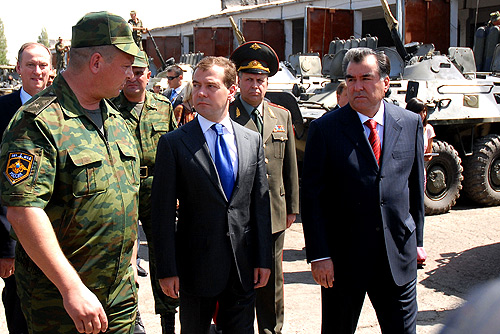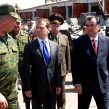
Russian, Tajikistani Officials Diverge on Progress Made in Base Talks
Publication: Eurasia Daily Monitor Volume: 9 Issue: 129
By:

As talks continue over the extension of Russia’s use of a military base in Tajikistan, the Central Asian country’s envoy to Moscow suggests that the two countries have reconciled their positions on all parameters of a new lease except its duration. Speaking to the media on June 29, Abdulmajid Dostiev acknowledged that the finalization of the new deal is held back only by disagreements over how long Tajikistan will host the Russian base under the lease. Moscow insists on extending its basing rights in the country for the next 49 years, arguing that a long-term arrangement is needed to secure funding for the development of the facility. The government in Tajikistan, in contrast, seeks to limit the new lease to ten years or less. Yet, according to the diplomat, Dushanbe and Moscow are now “very close” to a new base deal (ozodi.org, June 29).
Dostiev’s remarks came in response to Russia’s Ground Forces Commander, Colonel-General Vladimir Chirkin’s announcement that negotiations with Tajikistan over the future of the base have reached a deadlock. Speaking at the Russian parliament on June 26, Chirkin blamed Dushanbe for the stalemate: “Tajikistan has demands that are absolutely impossible to meet; [they] run counter to our proposals. We are now facing a situation from which there might be no way out whatsoever.” The Russian general admitted that the major point of contention had to do with the duration of the new lease, with Tajikistan unwilling to agree to the 49-year arrangement favored by Moscow. Chirkin has also suggested that unless the two countries find a way out of the deadlock, the Russian troops might vacate their garrisons in Tajikistan after the current lease expires in 2014. Echoing Chirkin’s statement, Russia’s Ministry of Defense announced that it had stopped funding the development of the base pending the outcome of “difficult talks” with Tajikistan (gazeta.ru, regnum.ru, June 27; interfax.ru, July 3).
The Russian general has also proposed that Dushanbe benefits more than Moscow from the latter’s military presence. Chirkin warned that disagreements over energy, land and water distribution might eventually lead to armed conflicts involving Tajikistan, Uzbekistan and Kyrgyzstan. According to Chirkin, the Russian troops based in Tajikistan would serve as a “guarantor of stability and security in the region” if such conflicts erupt. Russian officials and experts have made similar claims before, pointing to rising political tensions within Tajikistan and the uncertainties surrounding Afghanistan’s post-2014 future as major security threats that Dushanbe would not be able to tackle without Russia’s assistance (ria.ru, June 26; news.tj, avesta.tj, June 28).
Chirkin’s statements have drawn criticism from Tajikistan. The country’s Ministry of Defense has described the statements as “politically incorrect” and advised that all disagreements related to the new base deal be left to diplomats. Media and independent experts in Tajikistan have suggested that the Russian general’s remarks amounted to “blackmail” (news.tj, June 28, July 2).
At the same time, officials from within Tajikistan’s negotiation team admitted that Dushanbe is reluctant to sign a long-term lease with Moscow. According to these officials, the government in Tajikistan views Russia as an unreliable partner, which has reneged on major bilateral agreements and has been unwilling to help Dushanbe improve its strained relations with Uzbekistan, despite claiming to be Tajikistan’s “strategic ally” and “security guarantor.” Therefore, Dushanbe is keen to keep the duration of Russia’s renewed base lease under ten years to have room for political maneuver if Moscow remains an undependable ally (ozodi.org, July 1, 2).
The statements made by Dostiev and Chirkin indicate that the two countries have been able to overcome their differences over the issue of rent payment for the base. Dushanbe previously insisted that Moscow should pay for deploying its troops in Tajikistan, with media speculating that the payments could be as high as $300 million annually. Although Tajikistani officials have never explicitly confirmed these speculations, Dostiev asserted in February that “not a single country in the world today would give up the smaller plot of its land for free” (see EDM, March 7).
This still remains Tajikistan’s official position, with Dostiev mentioning vaguely on June 29 that, “nobody gives anything to anybody without getting something in return.” Yet, the price tag for the base in Tajikistan is only likely to increase now that Uzbekistan has pulled out of the Moscow-led Collective Security Treaty Organization (CSTO) and is reportedly considering hosting a US base on its territory (ozodi.org, vedomosti.ru, June 29).
Russia, however, has sought to negotiate a new lease with Tajikistan without committing to any rent payments. Moscow is the largest source of technical-military and economic assistance to Tajikistan. Russian diplomats have proposed that this assistance should be increased and should count as rent (see EDM, March 7). Apparently, Dushanbe has now agreed to such an arrangement and is insisting on a shorter base lease to see whether Moscow will prove as generous as it claims to be.
With about 7,000 troops stationed in Dushanbe, Kulob and Qurghonteppa, the base in Tajikistan is Russia’s largest ground force deployed abroad. Moscow has also sought to lease the Indian-renovated Ayni air base near the Tajikistani capital, but Tajikistan made it clear that Russia would have to pay to use the facility (see EDM, February 9, 2011). Based on regional developments – such as Uzbekistan’s exit from the CSTO and the efforts by outside powers, including China, India and the United States, to gain greater access to Central Asia – Tajikistan is thus attempting to walk a fine line between maintaining the financial and security benefits it draws from Russia’s continued presence on its territory, as well as trying to diversify its options for security partnerships beyond Moscow. Whether Dushanbe will succeed in striking the right balance will depend not only on Tajikistan’s diplomatic maneuvering, but also on Moscow’s ability to retain political dominance over a region that is increasingly opening up to the rest of the world.




